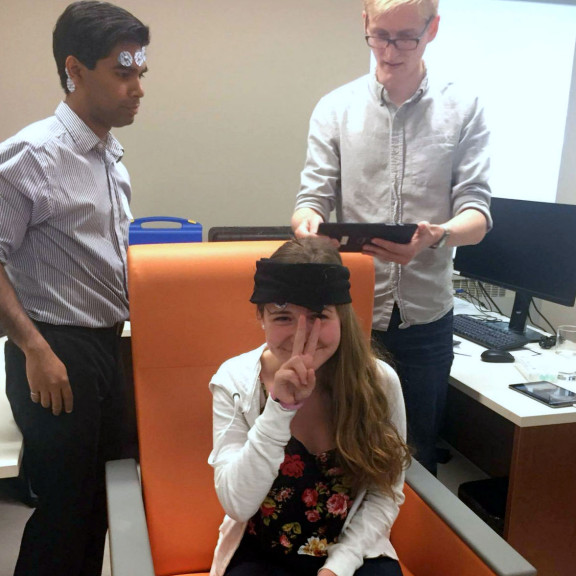50p

The Brain: the Ultimate Frontier
“Some say space is the final frontier, but I believe that the brain is the ultimate frontier” says Dr. Ryan Darcy, Brentwood '91, an acclaimed neuroscientist and entrepreneur who is currently leading a team of talented biomedical engineers, physicists, and other scientists at one of the foremost labs and treatment centers which is focusing on the brain and the treatment of those with brain damage.
This past Wednesday, a group of Brentwood students, ranging from Grades 9-12, were given the opportunity to travel to Surrey Memorial Hospital where they were given a tour of the facilities by Dr. Darcy. We were also allowed to try out some brain-wave testing technologies.
We arrived at the lab and were given a short introduction by Dr. Darcy, who outlined what it is that his team does, the short term care that they are able to give and the long term endeavours that they are undertaking. Then he introduced us to three members of his team (two biomedical engineers, Sujoy and Gabriel, and a physicist, Matt) who proceeded to show us an EEG and how it worked. We were then permitted to use it on one of our peers, Maria S, Hope ‘16, who tried it on permitting us to see how different facial actions and muscles movements affected her brain waves (laughing equals increased activity etc.).
We were then invited to try out a ‘meditation’ enhancer that was created by a company in collaboration with this team. The device works in the way that it first measures and gets acquainted with your brain waves by asking you to list various things (ex. tools, toys, countries). Once it has calibrated, it will then begin by playing the sounds of waves crashing against the shore. As one becomes more relaxed the sounds change (from beaches to storm clouds etc.) until one reaches the final level, which is signaled by the sound of birds chirping. The idea of this tool is that it will guide you to relaxation.
Mr. McCarthy, the teacher who had organized the trip tried the device on and we were all quite amused about how in under a minute after calibration, he was able to reach the ‘bird chirping’ level whereas when one of the Grade 12 students on the trip, Judy C, Hope ‘16) was unable to proceed past the first ‘waves’ level (Mr. McCarthy is obviously not stressed about final exams in two weeks). Afterwards, a member of our group raised an interesting question—will it actually help one to become more relaxed in daily life? Gabriel, the engineer who was leading the demonstration stated that one would have to do an experiment over a length of time in order to prove that theory.
We were then treated to a lecture on Visual Perceptions and the science behind illusions in the brain. The presentation was fascinating as we (our brains) were continuously tricked by simple things—such as the outline of a vase also making up two faces.
After the presentation, we met up with Dr. Darcy again and he took us across the street to the ‘Health Technology District’, which he believes “is developing into the ‘Silicon Valley’ of British Columbia.” He gave us a quick tour, explaining which companies occupy each office and what they do. An example of one of the “Health Technology” companies that resides in the building is a company that is working to create fashionable clothing for children who are afflicted with conditions that required them to continuously stay in the hospital or who have to deal with medical equipment being attached to their body for most of the day (catheter tubes etc.). The company also hopes to eventually incorporate ‘wearables’— health care tools (such as blood pressure monitors)—into the clothing itself.
We were then taken to a board room where the CEO of one of the companies (Conquer Mobile) talked to us and showed us one of the new apps that her company had created, which simulates life-like surgeries and the surgical tools required to perform these surgeries in order to give perioperative (surgical) nurses the opportunity to have exposure to and memorize which tools are needed for each surgery rather than having to fumble around their first time in an OR. The company is also working to create a surgery simulation app upon which would-be surgeons can familiarize themselves with procedures and techniques as well as giving actual surgeons the opportunity to brush up their knowledge and stay current on techniques for more rarely-done surgeries.
Finally, Dr. Darcy opened the floor for questions and after about twenty minutes of being bombarded with queries ranging from how he had reached his job and position to what level of brain activity constitutes the family of a ‘brain dead’ victim being given the power to withdraw care, we piled onto our bus and boarded the ferry.
It was an amazing and immersive learning experience that was definitely worth giving up our sleep-in for! A huge thank you to Dr. Darcy and his team for lending us some of their valuable time as well as to Mr. McCarthy for organizing this and chaperoning, Mr. Varro for chaperoning and our bus driver, Richard, for not only driving us but also allowing us to stop for some bubble tea on our way back to Brentwood.
Neha T, Allard ‘16